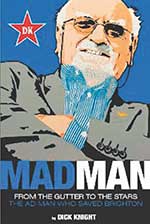Search: ' Masters football'
Stories
 From the gutter to the stars – the ad man who saved Brighton
From the gutter to the stars – the ad man who saved Brighton
by Dick Knight
Vision Sports, £20
Reviewed by Drew Whitworth
From WSC 325 March 2014
Dick Knight, chairman of Brighton and Hove Albion from 1997 to 2009, would never claim to have single-handedly saved the club. Yet in this autobiography he acknowledges that he was the “leader of an army” that rescued the Seagulls, an alliance of club and fans that not only won the right to build a new stadium, but saw the team win two divisional titles and a play-off final under Knight’s tenure. The very existence and relative success of Albion in 2013 has earned him the right to tell his side of the story.
Knight can add little to the two fine books (Build A Bonfire and We Want Falmer) already written about the fight to oust former chairman Bill Archer and build a new stadium, though he does confirm the essential roles played by John Prescott, Brighton & Hove council and the Football Association’s David Davies; the villains of the piece (including Archer, chief executive David Bellotti and Lewes District Council) are also familiar characters to those who know the history.
However, there is plenty of new insight within the book. Knight is a football fan but also a businessman or, more accurately, a man who knows business, having made his name in marketing (the “Hello Boys” Wonderbra ad being his most famous creation). These skills were constantly used to good effect during his time in charge of Brighton, including masterstrokes such as the nine-year Skint Records shirt sponsorship and Knight’s direct input into fan-led campaigns.
He also offers a relatively rare insider view of club chairmanship, often amusingly. He openly tells other chairmen that the Albion player they are about to buy is injury-prone or has disciplinary problems, but the sales proceed anyway. He discusses how American Express, the current stadium and shirt sponsors, were sold the deal on its community and corporate social responsibility values, rather than as a way of increasing brand awareness – which as Knight points out, they do not need.
This commitment to the Brighton & Hove community was central to Knight’s success as chairman, and it is clear in the book how he is as proud of the club’s award-winning Albion in the Community programme as anything won the pitch. Towards the end of the book, excellently ghost-written by the Times’ Nick Szczepanik and David Knight, there is a guarded but obvious critique of the new regime regarding how they view this part of the club’s operations.
There is frustration in parts of Mad Man, particularly regarding how his time as Brighton’s chairman ended, but generally Knight writes with the justified self-satisfaction of someone who took on a job at the worst possible moment and nevertheless saw his goals achieved. Via a form at the back of the book, Knight also offers Albion fans a chance to buy some of his remaining shares in the club to ensure they will always have a voice on the board. His “man of the people” credentials are firm and this book shows why he will never go short of a drink in Sussex.
 Eva Peron’s attempt to use football as a propaganda tool in the early 1950s compromised the integrity of the game in Argentina, argues Jon Spurling
Eva Peron’s attempt to use football as a propaganda tool in the early 1950s compromised the integrity of the game in Argentina, argues Jon Spurling
Eva “Evita” Perón could never be described as a football fanatic, although as a struggling actress and model in the 1940s, she appeared on Buenos Aires billboards wearing a Boca Juniors shirt for a toothpaste advert. Nonetheless, when Banfield, a small club ten miles south of the capital, faced reigning champions Racing Club in a two-legged title decider at the end of the 1950-51 season, she spotted a golden political opportunity.
 The money that added flair to Manchester City’s functionality has put Barney Ronay in a quandary
The money that added flair to Manchester City’s functionality has put Barney Ronay in a quandary
Imagine how boring being a billionaire must be. Not so much the process of becoming a billionaire, which is presumably studded with the thrill of ticking off those billionaire-entry marks: beachhouse-overload, mistress-profligacy, servant-saturation. But just being a billionaire, sealed within your own frictionless seven-star world, conveyed by helicopter gunship from lobby to suite to private island. This must surely be quite dull.
 By moving their central defenders forward into midfield, English managers are taking a tactical step backwards, says Adam Bate
By moving their central defenders forward into midfield, English managers are taking a tactical step backwards, says Adam Bate
After the initial excitement, it only took a few difficult games for questions to be raised about Phil Jones. “In the end… Jones is there to stop, not start, the fun,” wrote Paul Hayward in the Guardian. And he is right, of course. A defender should be able to defend. Less understandable is the desire to move Jones into midfield – as Alex Ferguson did against Liverpool – simply because he can trap a football. It seems that Jones is just the latest victim of English football’s love affair with converting the centre-half.